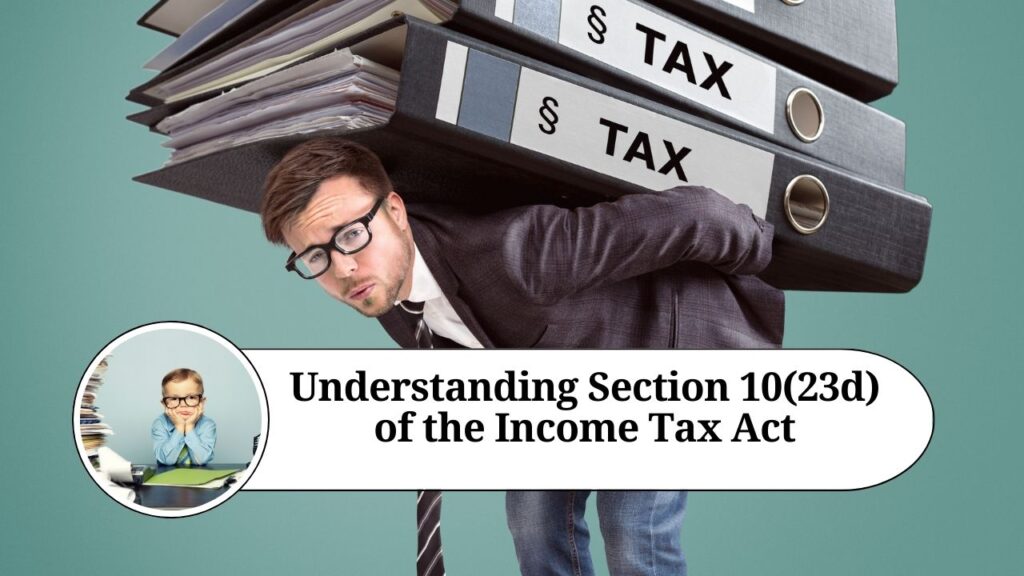Understanding Section 10(23D) of the Income Tax Act: Tax Exemption for Mutual Funds
In the complex world of taxation, certain incomes are exempt from being included in the total income, thereby not subject to tax. Section 10 of the Income Tax Act is a crucial provision that outlines various categories of such exempt incomes. Among these, Section 10(23D) specifically deals with the tax exemption for mutual funds. In this blog, we will delve into the details of Section 10(23D), explaining its provisions, implications, and benefits.
What is Section 10(23D)?
Section 10(23D) of the Income Tax Act provides tax exemption to specific mutual funds. The primary objective of this section is to promote investment in mutual funds by providing tax relief. According to this section, the income of certain mutual funds is not included in the total income, thus exempt from tax.
Key Provisions of Section 10(23D)
1. Eligible Mutual Funds:
Registered Mutual Funds:
Any income of a mutual fund registered under the Securities and Exchange Board of India (SEBI) Act, 1992, or regulations made thereunder.
Public Sector Bank or Financial Institution Mutual Funds:
Such other mutual funds set up by a public sector bank or a public financial institution or authorized by the Reserve Bank of India, subject to conditions specified by the Central Government through a notification in the Official Gazette.
2. Definitions and Explanations:
Public Sector Bank:
This includes the State Bank of India constituted under the State Bank of India Act, 1955, a subsidiary bank as defined in the State Bank of India (Subsidiary Banks) Act, 1959, a corresponding new bank constituted under the Banking Companies Acquisition and Transfer of Undertakings Act, 1970 or 1980, and any bank categorized as a public sector bank by the Reserve Bank of India.
Public Financial Institution:
As defined in section 4A of the Companies Act, 1956.
Public Financial Institution:
As defined in section 4A of the Companies Act, 1956.

Implications of Section 10(23D)
The provisions of Section 10(23D) have several important implications:
Tax Exemption for Mutual Funds:
The primary benefit is the tax exemption granted to specified mutual funds. This exemption encourages investors to invest in mutual funds, knowing that the income generated will not be taxed.
Promotion of Financial Stability:
By exempting mutual fund incomes from tax, the government aims to promote financial stability and growth. Mutual funds play a crucial role in mobilizing savings and channeling them into productive investments.
Boost to Investment Climate:
The tax relief provided under Section 10(23D) helps in creating a favorable investment climate, encouraging more investors to participate in the mutual fund market.
Benefits of Investing in Tax-Exempt Mutual Funds
1. Tax Savings:
Investors can enjoy significant tax savings as the income generated from these mutual funds is exempt from tax under Section 10(23D).
2. Diversification:
Mutual funds offer diversification, allowing investors to spread their risk across various assets, which is particularly beneficial for those seeking stable and diversified investment options.
3. Professional Management:
Mutual funds are managed by professional fund managers who have the expertise to make informed investment decisions, thereby potentially maximizing returns for investors.
4. Liquidity:
Mutual funds provide liquidity, enabling investors to easily buy and sell their units, offering flexibility in managing their investments.
5. Transparency and Regulation:
Mutual funds in India are regulated by SEBI, ensuring that investors’ interests are protected through stringent regulatory norms and transparency in operations.
How to Invest in Tax-Exempt Mutual Funds
1. Choose the Right Fund:
Identify mutual funds that qualify for tax exemption under Section 10(23D). Look for funds registered with SEBI or set up by public sector banks or public financial institutions.
2. Consider Your Investment Goals:
Align your investment choice with your financial goals, risk tolerance, and investment horizon. Different mutual funds cater to different needs, such as growth, income, or preservation of capital.
3. Research and Compare:
Conduct thorough research and compare the performance, fees, and management of various mutual funds. Utilize resources such as financial advisors, online platforms, and mutual fund rating agencies.
4. Understand the Tax Implications:
While the income from these mutual funds is exempt from tax, it is important to understand other tax implications, such as the treatment of capital gains on the sale of mutual fund units.
5. Invest and Monitor:
Once you have chosen a mutual fund, invest regularly and monitor its performance. Periodic reviews will help you stay aligned with your investment goals and make necessary adjustments.
FAQs on Section 10(23D)
1. What is Section 10(23D) of the Income Tax Act?
Section 10(23D) provides tax exemption to certain mutual funds, meaning the income from these mutual funds is not included in the total taxable income.
2. Which mutual funds are eligible for tax exemption under Section 10(23D)?
Mutual funds registered under the SEBI Act, 1992, or set up by a public sector bank, public financial institution, or authorized by the Reserve Bank of India are eligible for this exemption.
3. How does Section 10(23D) benefit investors?
The primary benefit for investors is the tax savings, as the income generated from these mutual funds is exempt from tax. This encourages more investments in mutual funds.
4. What are the key definitions under Section 10(23D)?
Key definitions include public sector banks, public financial institutions, and the Securities and Exchange Board of India (SEBI), which provide clarity on the entities involved in setting up eligible mutual funds.
5. Why is Section 10(23D) important for the economy?
Section 10(23D) promotes financial stability and growth by encouraging investments in mutual funds, mobilizing savings, and channeling them into productive investments.
Conclusion
Section 10(23D) of the Income Tax Act plays a pivotal role in encouraging investments in mutual funds by providing tax exemptions. Understanding these provisions helps investors make informed decisions, leveraging the benefits of tax savings, diversification, professional management, liquidity, transparency, and regulation. As always, it is advisable to consult with a tax professional or financial advisor to navigate the complexities of tax laws and optimize your investment strategy.
For the latest updates and detailed information, always refer to the official Income Tax Act or consult with experts in the field. Investing in mutual funds not only provides financial growth but also contributes to the overall economic development.
Stay informed, stay invested, and make the most of the tax benefits offered under Section 10(23D)!
For more insights on tax-saving investments and financial planning, visit our comprehensive guide on SmartTaxSaver.


Leave a Reply